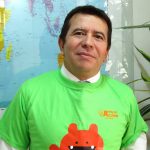
“We came here to clean up when this place was no more than undergrowth and rubble. You couldn’t see a thing; it was as if nature had swallowed the whole village. I am proud to have been there, recovering what was ours. Now I live happily here with my family.” Carmelo de Jesús Arias L.
While much information exists about El Salado, unfortunately a simple Google search returns one good piece of news for every ten bad ones, with most of the references to the community referring to the massacre of 60 people in the year 2000, one of the saddest and most shameful events that occurred during the lengthy Columbian conflict, a conflict that has affected a significant percentage of the population and has put Columbia in second place in the world ranking of countries with the highest number of forced migrations.
One statistic that sheds some light on the dimension of the tragedy is the fact that, in Columbia today, 6,983,372 people are registered as victims deserving of assistance and reparations – almost twice the population of Madrid (Spain) and 14% of the total population of Columbia.
El Salado, starting again towards the future
Before the tragic event this was a community with an economy based around agriculture and, as a result, was subject to the usual problems associated with the Columbian agriculture sector at the time, in other words, a lack of infrastructure linking the community with the principal towns, little presence of the state and the corresponding basic services like drinking water and quality health and education.
One fine day a group of silent community heroes who still felt an emotional attachment to their lands and lifestyle in the tranquil countryside decided, of their own accord, to initiate a return to the village in order to face the memory of the most painful days of their lives, but with the decision firmly taken to assume the titanic task of starting their lives again with an eye on the future. Little by little, and thanks to changes taking place in the country at the time, which included the demobilisation of paramilitary groups (those responsible for the massacre), the enactment of Victim and Land Restitution Laws, and the reduced intensity of the conflict, among other factors, these returned settlers found assistance in the form of private, public, governmental, non-governmental, national and international organisations.
In 2009 a joint effort promoted by the Semana Foundation blossomed into an intervention focussing on the reconstruction of El Salado, a community that not only had to rebuild its houses, streets and school but, most importantly, had to rebuild hope itself. The children of those who were forced to flee and had decided to return, of those who had lost their lives in the fratricidal conflict, were deserving of an opportunity to live in peace. The best form of reparation is to offer the possibility of a future, to instil the idea that violence is not a solution, to offer opportunities for a productive life, and to involve the state and the services it offers with communities in an effort to help them overcome the grief that only those who were subjected to this type of experience can understand but can only hope to do so with the assistance and understanding of others.
While there still remains a lot to do in El Salado, drinking water now runs along the aqueduct and supplies each and every homestead and the community now boasts a library, education centres, a paved road that reduces a trip that used to take 6 hours (on a good day) down to 40 minutes, places where children and young adults can play sports, a culture centre… The community now has the means to continue developing its own vision of the future, to interact with state institutions, to resist, and to grow. It is a community that is proud of its ‘social capital’ and, most of all, of the firm belief that time and the best efforts of all involved can only make it stronger.
The NGO Ayuda en acción, improving living conditions
The NGO Ayuda en Acción joined the El Salado alliance almost 5 years ago. Today, in an effort to continue promoting a development model in which we feel that change can only really be achieved after a period of 10 to 12 years, and while we continue to work in the rural sector of El Salado, our priorities continue to focus on access to drinking water, women’s and children’s rights, education, and, of course, the need to work alongside communities in the identification, development and management of productive alternatives that allow them to improve their quality of life. To this end we have been able to count on the support of some 2000 Columbians who make monthly financial donations as well as private companies like FERROVIAL, who have made possible such significant changes as the aqueduct that today supplies drinking water to the community. While much has been achieved, our efforts must continue, as much remains to be done before this story – a story that had such a tragic beginning – can have a happy ending.
While we cannot change history or forget it, ALL OF US TOGETHER, communities, companies, institutions and non-governmental organisations, can, and must, make sure it does not happen again.





There are no comments yet